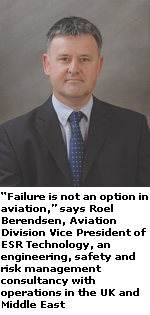Airports under pressure to improve safety
22/04/2009
Failure not an option as stringent new international rules call for pro-active safety management at airport and government levelNew international regulations are placing pressure on the Middle East aviation sector to improve safety management systems at airports, says a leading industry specialist.
Stringent international rules requiring airport operators to carry out extensive safety audits approved by national regulators are one of the factors behind the recently announced one-year delay in the opening of Dubai's new Al Maktoum International.
The General Civil Aviation Authority, which oversees all aviation related activity in the United Arab Emirates, has established a development programme to assist airport operators achieve the international safety levels expected for licensing.
 "The Middle East is one of the most dynamic aviation markets in the world which is continuing to expand as other parts of the world slip into recession," said Roel Berendsen, an Aviation Division Vice President of ESR Technology, a leading engineering, safety and risk management consultancy with operations in the UK and the Middle East.
"The Middle East is one of the most dynamic aviation markets in the world which is continuing to expand as other parts of the world slip into recession," said Roel Berendsen, an Aviation Division Vice President of ESR Technology, a leading engineering, safety and risk management consultancy with operations in the UK and the Middle East."Failure is not an option in aviation. The industry here in the Middle East is under pressure to achieve ever-improving levels of safety in a rapidly expanding and fiercely competitive market while operating in increasingly congested airspace and under continuous pressure for greater efficiency.
"It is, therefore, reassuring to find that regional regulators realise the critical importance of airports and regulators themselves carrying out comprehensive programmes to achieve the levels of
safety required by standards of the International Civil Aviation Organisation (ICAO)," he added.
Under strengthened ICAO regulations introduced this year, member states are required to establish a safety programme at government level and oversee audited safety management systems for airport operators, aircraft operators, maintenance organisations and service providers. All Arabian Gulf countries are signatories to ICAO.
"The aviation industry in the region has been well aware of the new ICAO requirement and has been gradually introducing the new safety management system for several years," adds Berendsen. "Nevertheless, it is our experience that the traditional compliance-based safety assurance is slow to be complemented by pro-active risk-based safety assurance of changes to aviation infrastructure.
"We have been involved in several new and upgraded airports projects in the region and have found a reluctance to carry out integrated safety assurance; instead relying on a tapestry of prescriptive standards and regulations that are often open for interpretation by the many different subcontractors in projects.
"As independent consultants we help industry make sense of the integral approach to safety assurance taking account of the rapid changes in the Middle East aviation industry. We work closely with airports, air traffic management organisations, airlines, engineering contractors, original equipment manufacturers and regulators.
"As a result, our clients achieve higher levels of safety assurance, improved operations, efficiently implemented regulatory standards and are ensured that their new infrastructure and operations meet regulatory compliance."
ESR Technology is a member of the Airports Council International, the Civil Air Navigation Services
Organisation, British Aviation Group and North West Aerospace Alliance. ESR Technology's many aviation consultancy contracts have included a helicopter operations study for Shell in Nigeria; business contingency planning for Bermuda International Airport; corporate risk management review for Aer Lingus; and third party risk assessment for London City Airport.
www.esrtechnology.com